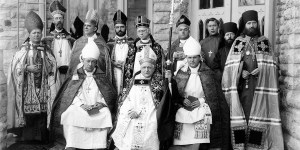On the eve of the opening of the Week of Christian Unity, which runs from January 18 to 25, Pope Francis received in audience an ecumenical delegation from Finland. Among those present were a Lutheran bishop, Bishop Jukka Keskitalo, and representatives of the Sami Christians, the indigenous people of Lapland.
In his speech, Pope Francis insisted on the need to always move forward "with humble patience." He acknowledged that the road can be long and tiring, and that the goals can sometimes seem "distant and difficult to reach."
However, he highlighted two anniversaries the celebration of which could help move Christians forward on the path of communion.
The 1700th Anniversary of Nicea
"In 2025, we will celebrate the 1700th anniversary of the Council of Nicaea," Pope Francis began. "The Trinitarian and Christological confession of that Council, which recognizes Jesus as 'true God from true God, consubstantial with the Father,' unites us to all the baptized," he stressed, insisting that only by being close to Christ "can we fully walk the path of full unity."
Will the Catholic Church celebrate the Peace of Augsburg?
The second celebration will take place in 2030, with the commemoration of the 500th anniversary of the Augsburg Confession, the pope said. "Will we be there? Will we not be there? I don't know," said the 85-year-old pontiff, before explaining: "At a time when Christians were on the verge of separating, this Confession tried to preserve unity.
The treaty, signed by Charles V (the Germanic Roman Emperor and defender of the Catholic Church) and the League of Smakalde (a union of Protestant princes in the Empire), temporarily ended the Wars of Religion between 1555 and 1618 in Central Europe. It established the principle of cujus regio, ejus religio, i.e. "he who owns the territory determines the religion."
This text was eventually rejected by Catholic theologians and could not prevent division, recalled Pope Francis. However, he assured, this anniversary could be "a fruitful occasion to confirm and strengthen us on the path of communion."
In June 2021, Pope Francis pleaded with representatives of the Lutheran World Federation to continue the journey "from conflict to communion." While it is impossible to let go of "the sad events" of the past, it is possible to re-read them in the context of a "reconciled history," he said, as 2021 marked 500 years since Martin Luther's excommunication.
Dialogue with indigenous people
Addressing the Sámi delegation in particular, Pope Francis also stressed that "a pastor must be concrete with concrete people, with a concrete people, but he must never stop dreaming. As he does regularly, he invited the indigenous faithful to move forward on the path of unity in their daily lives, leaving theologians to study and discuss on their own.



